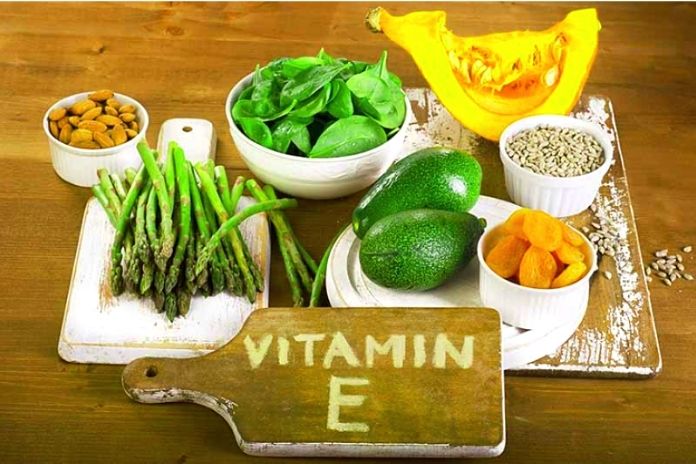Anti-aging agents, protective shields & Co.: That is why it is worthwhile to incorporate vitamin E into your skincare routine and diet. There are many vitamins: But vitamin E, in particular, plays a vital role for skin, hair, and in the fight against wrinkles. Why is it so good? And what if you don’t take in enough of it? The best tips on effects, nutrition, and skincare for everything to do with the power vitamin.
What Is Vitamin E
The term vitamin E encompasses various chemical compounds that have antioxidant effects and which the body takes from mainly vegetable dietary fat. The group of these compounds is also called tocopherols. The best known is alpha-tocopherol. It also has the highest bioactivity. Vitamin E is fat-soluble and can be stored in fatty tissue by the body. However, it is not formed independently but must be taken in with food.
As an antioxidant, tocopherols ensure that free radicals (harmful oxygen compounds) are rendered harmless. Free radicals arise, for example, from UV radiation, alcohol, nicotine, or stress, and can cause cell damage. The result of this is, for example, that the skin ages faster and wrinkles or certain diseases are promoted.
Vitamin E Deficiency: Causes And Symptoms
With a healthy and balanced diet, a vitamin E deficiency can rarely occur. However, if you eat a very low-fat or one-sided diet for too long, this can lead to a deficiency. Various diseases that inhibit the absorption of dietary fats via the intestine can also be responsible for an undersupply. These include, for example, celiac disease, pancreatitis, Crohn’s disease, or diseases of the biliary tract.
How Is Vitamin E Deficiency Expressed In The Human Body?
A deficiency in tocopherol is characterized by headaches, muscle weakness, digestive problems, and difficulty concentrating. You feel tired all the time, and the performance and function of the immune system can be impaired. Another symptom is that the skin can be dry and cracked.
Effects On Skin And Health
As already described above, vitamin E is an antioxidant that protects against cell damage. In addition, vitamin E is said to have anti-inflammatory and immune-boosting properties. The vitamin also plays a vital role in healthy cardiovascular function.
Many beauty products, such as creams, oils, or face masks, contain vitamin E to ensure smoother, more beautiful skin. The oil it contains is ideal for caring for dry skin. The vitamin E effect helps store moisture, prevent or reduce wrinkles, protect the cells, and support their regeneration. Vitamin E is not only a component of some beauty products. It can also be applied directly to the skin as a vitamin E oil.
What Does Vitamin E Contain?
Vitamin E is primarily made from vegetable sources. The following foods are excellent sources of vitamin E:
- Nuts (such as hazelnuts)
- vegetable oils (e.g., sunflower oil, wheat germ oil, olive oil, sunflower oil, rapeseed oil)
- Fruits (such as blueberries and blackcurrants)
- linseed
- Vegetables (such as avocados, sweet potatoes, peppers, spinach, and kale)
- green leafy vegetables
- fish
Tocopherols protect food from oxidation processes that can occur during processing or storage or as a result of exposure to light and air. Vitamin E helps maintain the taste and nutritional content.
Also Read: Vitamin A: The Health Benefits
Natural And Synthetic Vitamin E: What’s The Difference?
The body equally absorbs natural and synthetic vitamin E. After that, however, it is processed differently. This is because the two vitamins differ in their chemical structure, composition, and mode of action. Our body has a higher affinity for natural d-alpha-tocopherol and takes it in preferentially. It, therefore, has a higher bioavailability and is better stored.
Only around 50 percent of the synthetic vitamin E is stored, and the rest is excreted more quickly. To achieve the same effect as with natural tocopherol, you would have to consume twice as much synthetic vitamins.
Natural tocopherol: is also known under the names d-alpha-tocopherols or RRR-alpha-tocopherol or D- (RRR) -alpha-tocopherols. Beta, gamma- and delta-tocopherols also occur in nature. Together with alpha, they are grouped under the term “mixed tocopherols.”
Synthetic vitamin E: is also called dl-alpha-tocopherol or all-rac-alpha-tocopherol.
The Daily Requirement
The daily requirement is described as follows:
- Women 11 to 12 mg
- Pregnant women 13 mg
- Breastfeeding 17 mg
- Men 12 to 15 mg
- Older people aged 65 and over need a little more miniature than younger adults
Since up to 1,000 mg of the vitamin can be stored in the liver, adipose tissue, and muscles, it is not consumed daily. On average, we can get by with the stored supplies for up to ten days and cover our needs with a healthy diet.
Overdose: Can You Take Too Much Vitamin E?
Overdosing through food is not possible. It is different when you take nutritional supplements, for example, in the form of vitamin E capsules. If there is an oversupply of synthetic vitamin E in particular, symptoms such as gastrointestinal complaints can occur, or the thyroid hormone level in the blood can be reduced. Too much vitamin E is also suspected of increasing mortality and promoting the development of cancer. People with bleeding disorders and anticoagulants should take special care because one can affect blood clotting function. Tocopherols is a food supplement that should only be taken if they are deficient and only after consulting a doctor.
E-vitamins For The Skin: Tocopherol In Cosmetics
Body care products with vitamin E (e.g., in cream, as pure oil, or in capsules) care for the skin and offer perfect anti-aging protection. As an antioxidant, vitamin E in cosmetics protects the skin from free radicals, regenerates and revitalizes, and supplies moisture. Most vitamin E supplements contain synthetic (DL) alpha-tocopherol. Products that contain vitamin E from natural raw materials usually consist of d-alpha-tocopherol (or the mixed tocopherols).
Also Read: 10 Best Vitamins For Hair Loss

